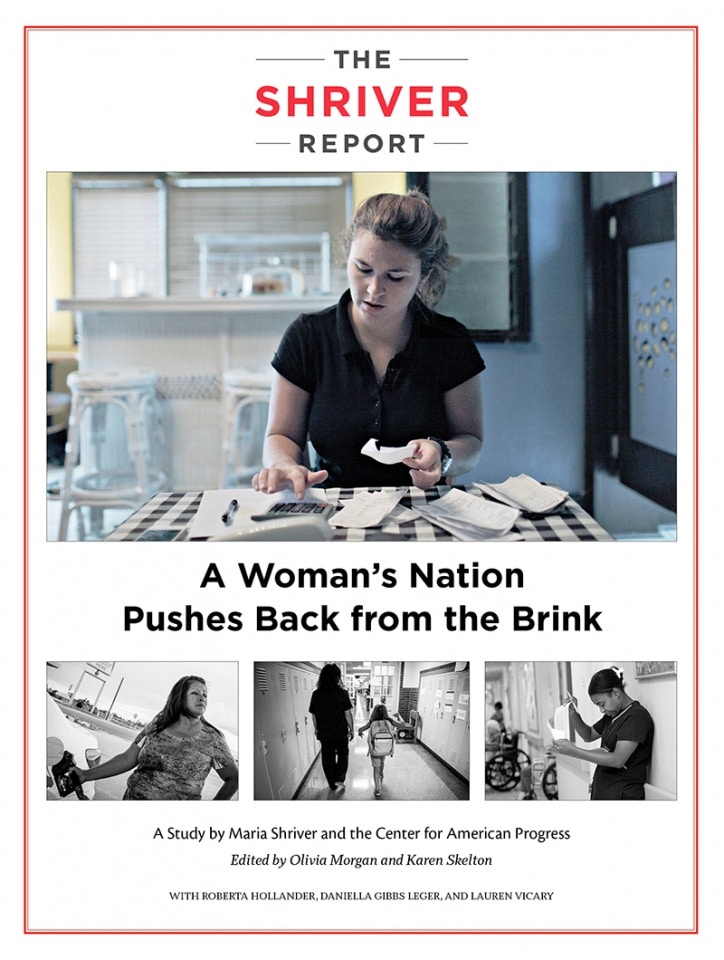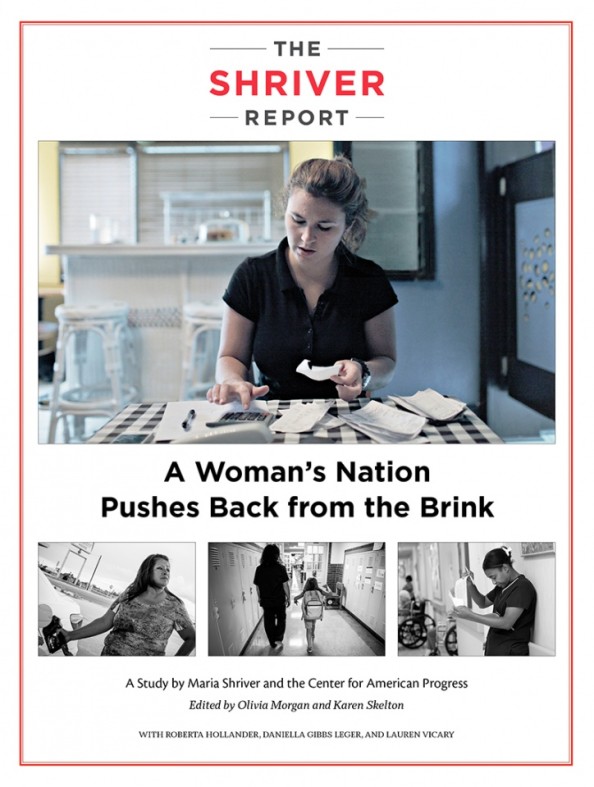Shriver Report and Paid Leave: How Women are Pushing Back from the Brink

By Ellen Bravo
Of all of the things working women need to get onto more secure economic footing, paid leave tops the list, according to a newly released report titled “The Shriver Report: A Woman’s Nation Pushes Back from the Brink.” The women surveyed believe no other single policy would do more to help protect women’s jobs and income while also helping to improve the health and the lives of their families.
Who were the women Maria Shriver and her team talked to? Representatives of the 1 in 3 American women who live in or at the brink of poverty – what Shriver describes as living in economic peril. That’s a total of 42 million women raising 28 million children.  They’re women like Shelby Ramirez in Denver, Colorado, a hotel security guard who is the mother of two daughters and a grandmother of two. Like many people, Shelby also cares for an elderly parent.
They’re women like Shelby Ramirez in Denver, Colorado, a hotel security guard who is the mother of two daughters and a grandmother of two. Like many people, Shelby also cares for an elderly parent.
“As a woman working a low wage job, it can be a struggle to make it paycheck to paycheck,” Shelby says. Whey her younger daughter needed surgery at the same time her parent needed immediate medical attention, Shelby was able to take time to care for them thanks to the Family and Medical Leave Act – but the leave was unpaid.
“Having to take time off unpaid was an enormous financial burden for me,” said Shelby. “After not paying rent and utilities it took me four months to only partly get caught up with bills. Although FMLA is great and I was able to keep my job, having paid family and medical leave is necessary now and for the future for our families.”
What the Shriver Report makes clear is that both women and men are breadwinners and caregivers – and they need policies that allow them to succeed at both. Otherwise millions of families are just one illness or birth away from economic peril.
“Men are totally a part of this conversation, Maria Shriver told David Gregory on Meet the Press. “What’s good for women at the center of the economy is also good for men. Men need sick days because they’re going to be caring for parents as well… These are smart family policies that we’re talking about in this report.”
What’s at Stake
According to the Families and Work Institute, which did research for the Shriver report, women in low-wage jobs work fewer hours even though they need the money because they can’t get the flexibility they need to care for kids or parents. They also have shorter job tenure than workers in higher-paid jobs. More than half (52%) of low-income employees have worked for their current employer for less than 2 years compared with only 17% of high-income employees.
Time on the job they impacts wages and income. Gaps in a resume can make someone look like an unreliable worker; new jobs become harder to find. Too often people in this situation find themselves in a cycle of debt and payday loans – more vulnerable to falling over the brink.
For women in the bottom third and many men as well, being a good parent or following doctor’s orders means being deprived of vital income. Those who have shared stories in Family Values @ Work’s Story Bank say the loss of one day’s pay can equal a month’s worth of diapers. Women like Tamara describe the difficult choices – her metro card, the laundry or the phone — after being with her daughter as she underwent medical tests. If the flu knocks you out for a week, goodbye rent or mortgage.
Even worse is losing a job altogether. Cinthia, a domestic worker in Brooklyn, knew what that was like – she was fired when she had to take her child to the hospital when he suffered a seizure. To avoid another firing, many women do what Cinthia did when she tore ligaments in her finger while cleaning behind a mattress. The doctor ordered surgery, but Cinthia made do with ice and a splint.
“I can’t afford not to be working because I have to support my children,” Cinthia said. “If I stop working for a week, I won’t be able to pay for food, rent, or the gas, electricity and phone bills. And I don’t have the luxury of not going to work, because if I miss several days, then I’ll lose those jobs.”
What to Do
The problem, says Maria Shriver, is that “government and businesses have not kept up and we need to modernize our relationship to women” so that they will have a “foundation to stand on.” She urges women to come together and work along with men for change.
Policies like paid sick days and family and medical leave insurance are a key part of that foundation. And women and men around the country are becoming involved in the fight to win those policies – to make sure that employment is a way out of poverty, not another form of poverty, and that a job strengthens family rather than putting loved ones at risk.
In addition to becoming engaged in campaigns to win concrete policy change, women, who represent 54% of the electorate, should and will use their vote. Candidates who champion policies that value women’s work in the labor market and at home will reap the benefit. And those who don’t may learn what it’s like to lose a job.